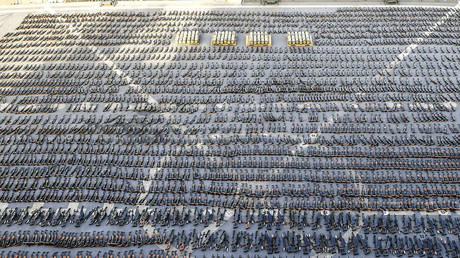
With NATO stocks running low, Washington eyes loot from the Yemen blockade
The US government is trying to find a legal way to send Ukraine the weapons allegedly sent to the Houthis by Iran and confiscated off the coast of Yemen, the Wall Street Journal reported on Tuesday.
Citing anonymous US and European officials, the WSJ said that the White House is looking at “wiggle room” in UN regulations, so that the rifles, rockets and ammunition seized on the high seas can be redirected to Kiev.
The amount of seized weapons is small compared to what the US and its allies have sent to Ukraine over the past year, the unnamed officials say it would be a symbolic punishment for Iran supplying Russia with drones – something both Tehran and Moscow have denied.
“It’s a message to take weapons meant to arm Iran’s proxies and flip them to achieve our priorities in Ukraine, where Iran is providing arms to Russia,” one unnamed US official told the WSJ.
According to the Journal, the cache amounts to 5,000 rifles, 1.6 million rounds of ammunition for them, a score of anti-tank rockets and some 7,000 proximity fuses. The loot came from three fishing boats boarded by the US and French sailors over the past several months in the Gulf of Oman.
“What change can this make to war?” the Houthi deputy information minister, Nasr al-Din Amir, told the Journal when asked about the idea of sending the weapons to Ukraine. “They’ve been sending much heavier weapons.”
Washington, Berlin and London announced last month they would deliver heavy tanks to Kiev. As of this week, according to the Pentagon, the US alone has provided Ukraine with over 100 million bullets.
At Monday’s meeting of NATO defense ministers in Brussels, Secretary-General Jens Stoltenberg admitted that “the current rate of Ukraine’s ammunition expenditure is many times higher than our current rate of production,” which he said was putting a strain on the West’s military industry and “depleting allied stockpiles.”
Russia has warned the US and its allies that continuing to send weapons to Ukraine risks involving them in the conflict directly and only delays the inevitable.




